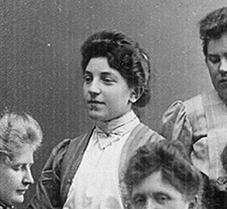Search for Names, Places and Biographies
Already layed Stumbling Stones
Suche
Frieda Berlin (née Heyn) * 1883
Wrangelstraße 17 (Eimsbüttel, Hoheluft-West)
HIER WOHNTE
FRIEDA BERLIN
GEB. HEYN
JG. 1883
ENTRECHTET / GEDEMÜTIGT
FLUCHT IN DEN TOD
12.8.38
further stumbling stones in Wrangelstraße 17:
Heinrich Rosenberg, Margarethe Rosenberg
Frieda Berlin, née Heyn, born on 6 Dec. 1883 in Bremervörde, suicide on 10 Aug. 1938
Wrangelstraße 17
Frieda Fanny Berlin, the mother of Erwin Berlin (see corresponding entry) was from Bremervörde. For nearly 200 years, Jewish families had been living in Bremervörde, and the Heyn family had been residents there for just as long. The family’s ancestor, Heyn Levi, had traded in the most diverse goods. Frieda’s parents were Heinrich Heyn (1848–1919) and Mathilde, née Eisenberg (1854–1933). The mother was from Braunschweig. In the twentieth century, the Heyn family ran a business for yard goods in Bremervörde. Tensions between Jews and non-Jews had not occurred there before 1933. The Heyns played a prominent role in municipal self-government and were members of associations and institutions such as the fire department, the shooting society, or the choral society. Frieda Heyn belonged to a "ladies’ circle” before getting married and moving to Hamburg in 1905. The Heyn family had already owned the residential and business building at Alte Straße 80 since 1759. This was also the location of the prayer room of the Bremervörde-Zeven Synagogue Community that was destroyed in 1938. In 2010, a commemorative plaque was put up on the Bremervörde City Hall for the 41 Jewish citizens who had become victims of persecution during the Nazi era. Twenty-two of these 41 persons were driven into exile. The commemorative plaque also contains the name of Frieda Fanny Heyn.
Alexander Berlin (born in 1878) and Frieda Heyn had married in Hamburg in Aug. 1905. This was where the "lottery collector” Alexander Berlin lived with his parents, Meier and Malchen (Mele) Berlin at Grindelallee 132, where his father ran a grocery store. One year after their wedding, Frieda and Alexander Berlin had a son, Erwin (see corresponding entry). Before moving to Wrangelstraße 17, they lived at Bornstraße 6, Isestraße 21, and at Moltkestraße 57.
Frieda’s brother Hermann (born in 1879), who was actually supposed to take over his father’s company, died during the First World War in France. Therefore, the second son Siegfried managed the business from 1920 onward. Since 1919, Siegfried was the head of the Synagogue Community. As early as the 1920s, business had not been particularly profitable, and starting in 1933 the company was in even worse shape due to the increasing anti-Semitism, and it had to be put up for auction under court order in 1936. In Aug. 1938, the Siegfried Heyn Company ceased to exist. In Oct. 1937, Siegfried and his wife Alice, née Israel, had moved to Hamburg, Bogenstraße 15. Alice Heyn was a native of Hamburg. In Apr. 1938, the couple moved away to Bremen. After the November Pogrom of 1938, Siegfried was detained in the Sachsenhausen concentration camp but managed after his release in Apr. 1940 to arrange for emigration with his wife to New York. In this endeavor, he was helped by his son Günther and daughter Ilse, who had already emigrated to New York in 1938.
Frieda did not succeed in emigrating. Her husband Alexander had died in 1936. It must have been difficult for her to endure the persecution without support by her husband. With her brother and sister-in-law moving away, she probably became even more isolated. She was in such despair that she went to her death on 10 Aug. 1938. At the Harbor Hospital, she succumbed to her serious internal injuries "after a fall from a height.”
Alexander Berlin had five siblings, of whom only the sisters Frieda (born in 1881) and Minna (born in 1883) were still alive when the Hamburg Jews were deported. At the time, both of them lived on Grindelallee. Frieda was deported to Minsk on 8 Nov. 1941 and Minna to Riga on 6 Dec. 1941.
Translator: Erwin Fink
Kindly supported by the Hermann Reemtsma Stiftung, Hamburg.
© Susanne Lohmeyer
Quellen: 1; 4; 5; StaH 332-5 Standesämter, 1091 und 228/1938; StaH 332-5, 8639 und 232/1905; HAB II 1905, 1910, 1918, 1926; Elfriede Bachmann, Zur Geschichte der Juden in Bremervörde, S. 129ff.; Zevener Zeitung, online-Ausgabe 7.8.2010; Bremervörder Zeitung online-Ausgabe 10.11.2010; Prospekt "Juden in Bremervörde" (www.gymbrv.de).


